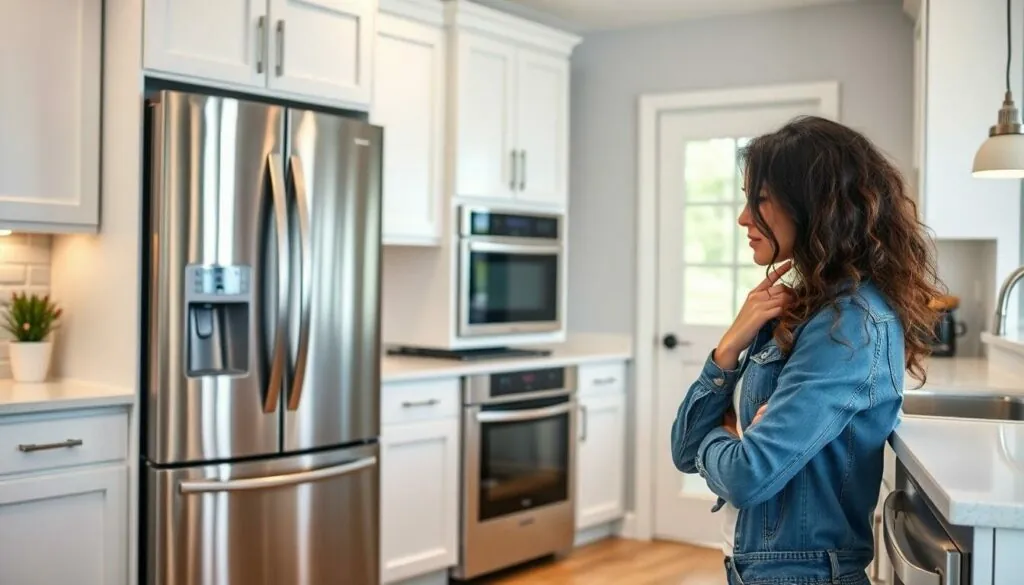Table of Contents
ToggleHomeownership can feel like a never-ending rollercoaster ride, complete with thrilling highs and stomach-churning lows. One moment you’re sipping coffee in your cozy living room, and the next, your washing machine decides it’s auditioning for a role in a disaster movie. That’s where home insurance comes in, acting like a superhero ready to swoop in and save the day—especially when it covers your beloved appliances.
Understanding Home Insurance Including Appliances
Home insurance protects against various risks, including damages to the dwelling and personal property. Coverage for appliances often varies by policy, emphasizing the need for homeowners to understand specifics. Many standard home insurance policies cover appliances damaged by specific risks, such as fire, theft, or vandalism.
Homeowners might find it beneficial to include additional endorsements for full coverage on major appliances. This protection comes from specialized add-ons that optimize financial security. Examples of appliances often covered include refrigerators, washers, and dryers.
Replacement cost coverage allows homeowners to recover the full value of damaged appliances, rather than depreciated value. Some insurers offer coverage for appliance failure due to mechanical breakdowns. Understanding the terms of coverage, including exclusions, is vital for homeowners to avoid surprises during claims.
Home insurance premiums generally factor in the overall value of the home and its contents, including appliances. Comparing multiple quotes from different providers can reveal the best options for appliance coverage. Evaluation of the policy details ensures homeowners are prepared for potential appliance-related incidents.
Specifics can significantly impact insurance coverage, making it essential to read policy documents thoroughly. Asking insurers about appliance coverage directly can clarify any ambiguities. Clarifying the details contributes to informed decisions and safeguarding valuable home appliances.
Types of Home Insurance Policies

Home insurance policies vary significantly in scope and coverage options. Understanding these types assists homeowners in securing the protection their properties and appliances require.
Basic Coverage
Basic coverage provides essential protection against common risks. Policies typically cover perils like fire, theft, and vandalism. Homeowners can expect to receive compensation for damages to the dwelling and personal property, including appliances. Coverage for appliances often aligns with the primary structure’s protection level. This basic form does not always include coverage for appliance breakdowns due to wear or mechanical failure. Homeowners considering basic policies must assess their specific needs, especially regarding valuable appliances.
Comprehensive Coverage
Comprehensive coverage offers more extensive protections compared to basic policies. This type covers a wider range of risks, including accidental damage and certain natural disasters. Homeowners benefit from enhanced financial security, as this coverage often includes protection against appliance malfunctions due to various conditions. Additionally, many comprehensive policies extend coverage to major appliances like refrigerators and washing machines. Formulating a complete understanding of what constitutes covered appliances relies on careful policy review. Homeowners should evaluate both standard terms and any additional endorsements for comprehensive coverage options.
Coverage for Appliances
Understanding coverage for appliances is essential for homeowners. Insurance policies vary, and it’s crucial to be aware of what specific appliances are included.
Commonly Covered Appliances
Standard home insurance policies frequently cover major appliances. Refrigerators, ovens, and microwaves often fall under this coverage. Washers and dryers typically receive protection as well. Coverage usually extends to other built-in appliances, such as dishwashers. Homeowners should confirm which items their policy specifically includes. It’s advisable to check for coverage against risks such as fire or theft.
Exclusions to Consider
Homeowners should remain aware of certain exclusions in their policies. Wear and tear isn’t typically covered, so aging appliances may not qualify. Mechanical failures might also fall outside covered risks. Additionally, damage caused by natural disasters often requires additional endorsements for protection. Reviewing policies for clarity on exclusions is vital. Understanding these limitations helps homeowners make informed decisions about necessary coverage adjustments.
Factors Affecting Home Insurance Premiums
Home insurance premiums vary due to several influencing factors. Understanding these elements helps homeowners make informed decisions about their coverage.
Location and Risk Assessment
Location plays a significant role in determining home insurance premiums. A home situated in a flood-prone area often incurs higher costs due to increased risk. Additionally, neighborhoods with higher crime rates may result in elevated premiums, reflecting the likelihood of theft or vandalism. Insurers commonly assess local weather patterns, as regions prone to natural disasters significantly affect rates. Properties in urban areas generally face different risks compared to those in rural settings. Ultimately, risk assessments incorporated into premiums ensure appropriate protection aligned with individual geographic locations.
Types of Appliances and Their Impact
Types of appliances also influence home insurance premiums. Coverage for high-value appliances typically results in higher policy costs. Major appliances such as refrigerators, dishwashers, and washers factor into this equation. Homeowners with luxury appliances may find their premiums reflect the risk associated with potential damage or malfunction. Furthermore, the age and condition of appliances also matter, as older units may have a higher likelihood of failure. Insurers often consider the replacement costs of these appliances, influencing overall premium rates. Understanding how appliance types affect home insurance helps homeowners accurately assess their coverage needs.
Tips for Choosing the Right Policy
Choosing the right home insurance policy requires careful consideration of various factors. Understanding personal needs plays a crucial role in this decision-making process.
Assessing Your Needs
First, homeowners must evaluate their specific risks. Identify high-value appliances and consider their replacement cost. Assessing the likelihood of damage from local hazards such as floods or fires is essential. Also, he or she should account for the age and condition of existing appliances, as older models may require more coverage. Create a comprehensive list of items needing protection, focusing on essential appliances like refrigerators and washers. Prioritizing coverage for necessary items ensures adequate financial protection during unexpected failures.
Comparing Insurance Providers
Next, comparing insurance providers proves vital. Research multiple insurers to identify those offering the best coverage options. Request detailed quotes that clearly outline specifics regarding coverage limits for both the dwelling and appliances. Evaluate customer service ratings and claims handling procedures, as these factors impact overall satisfaction. Understand the terms and conditions of each policy, paying close attention to exclusions related to appliance coverage. Gathering information and exploring different options empowers homeowners in finding the most suitable policy for their needs.
Home insurance is a crucial aspect of protecting one’s investment in a home and its appliances. Understanding the specifics of coverage can make a significant difference when addressing unexpected damages or appliance failures. Homeowners should take the time to review their policies and consider any necessary endorsements to ensure comprehensive protection.
By evaluating individual needs and the unique risks associated with their properties, they can make informed decisions. Choosing the right policy not only safeguards against common risks but also provides peace of mind knowing that major appliances are covered. Ultimately, being proactive about home insurance can lead to better outcomes during unforeseen challenges.







